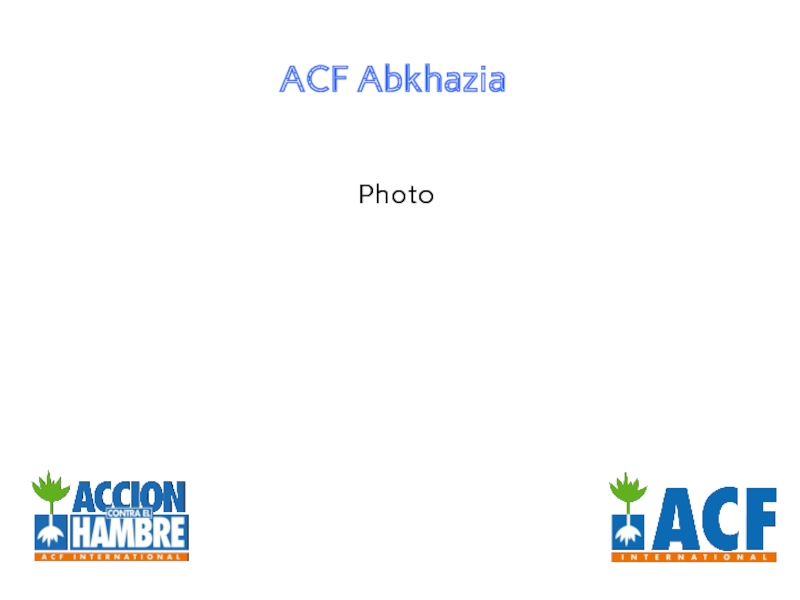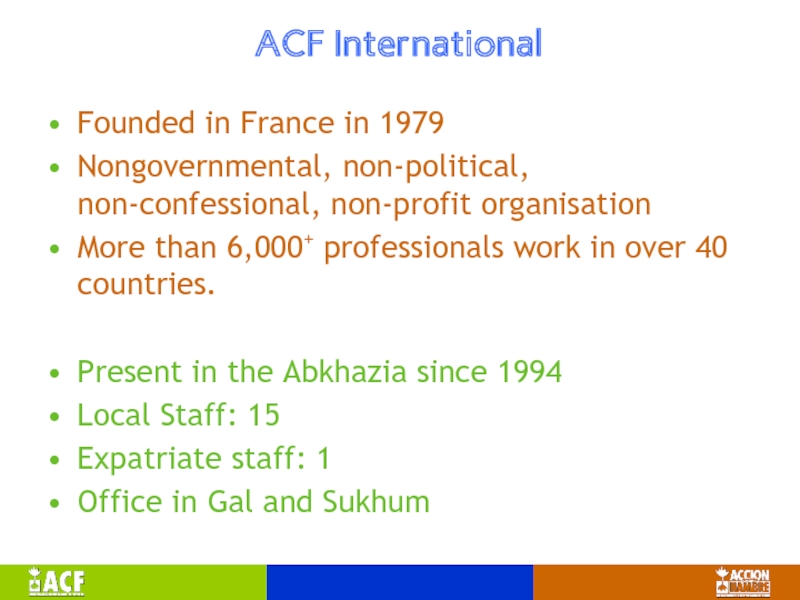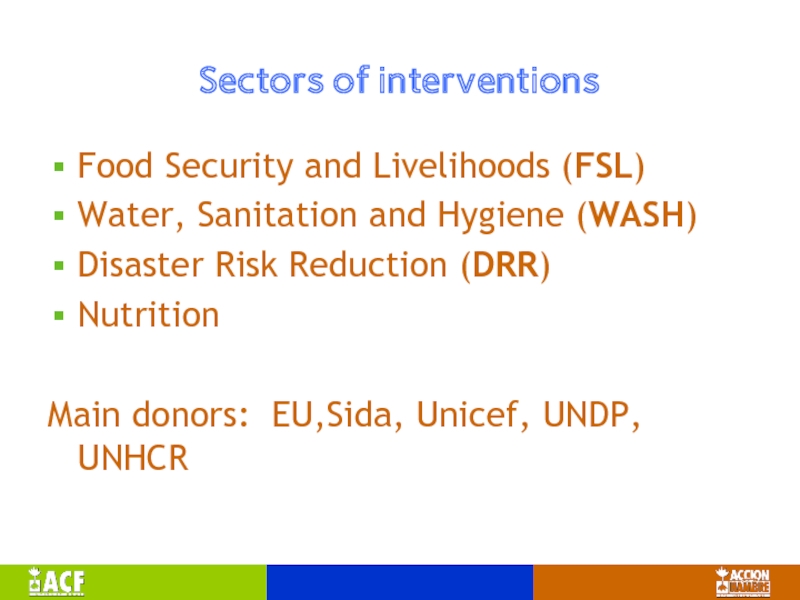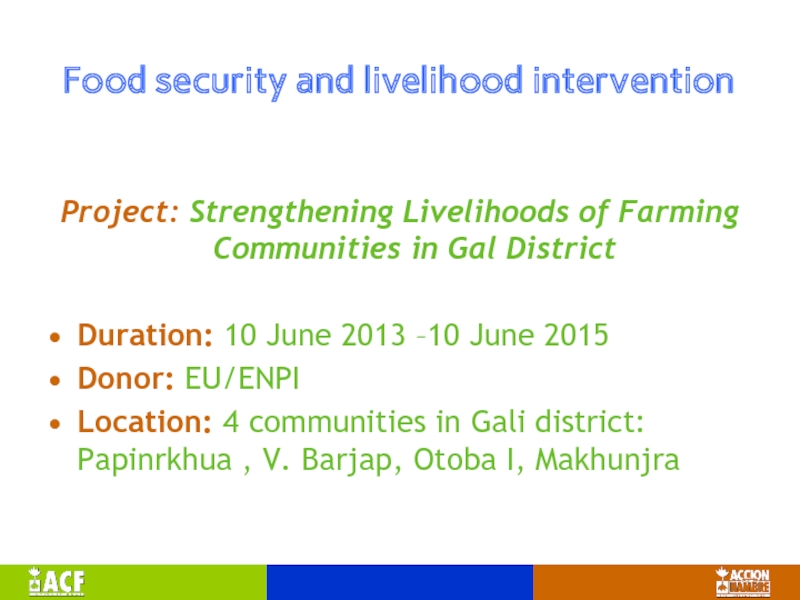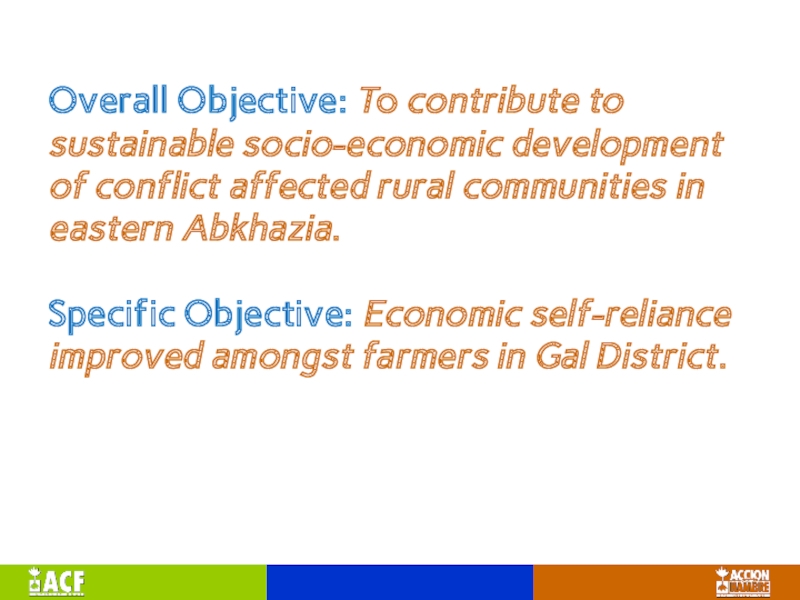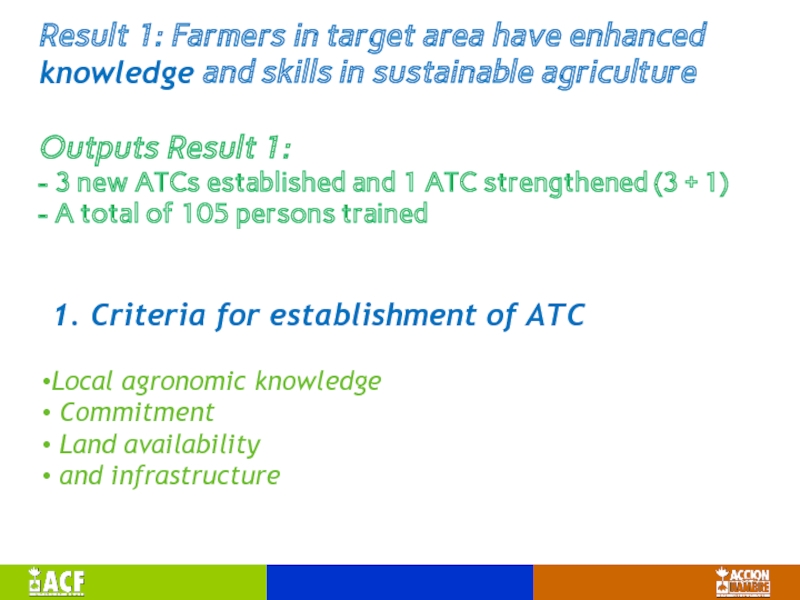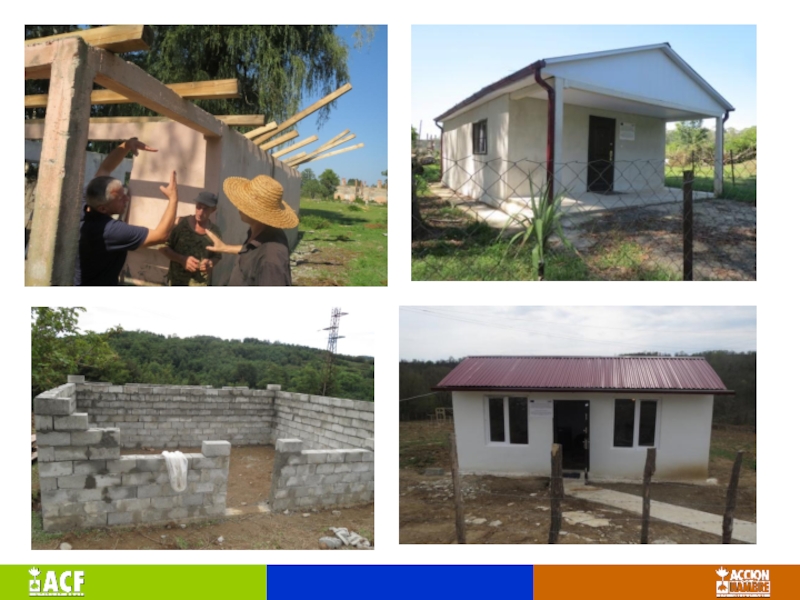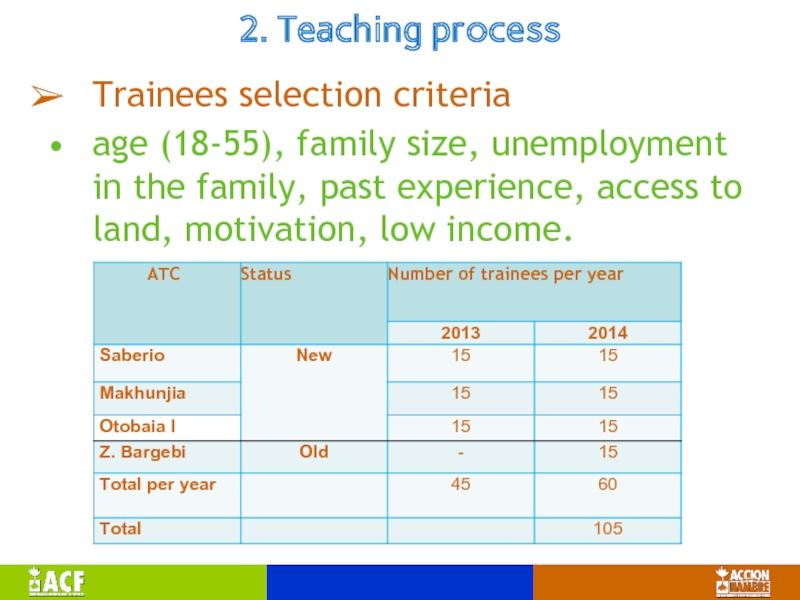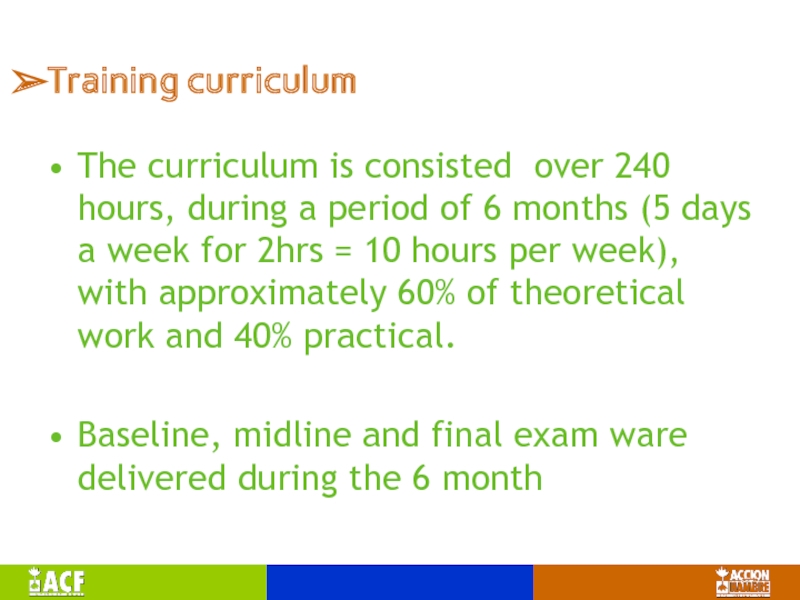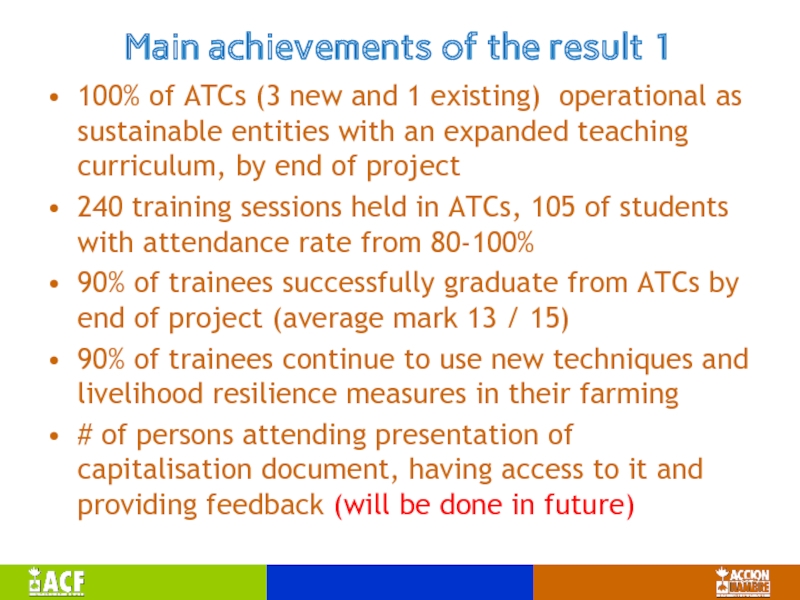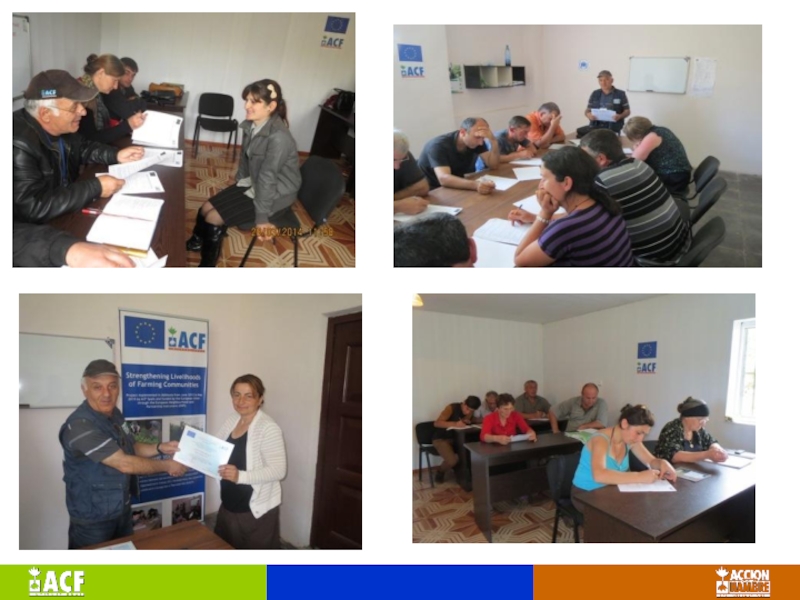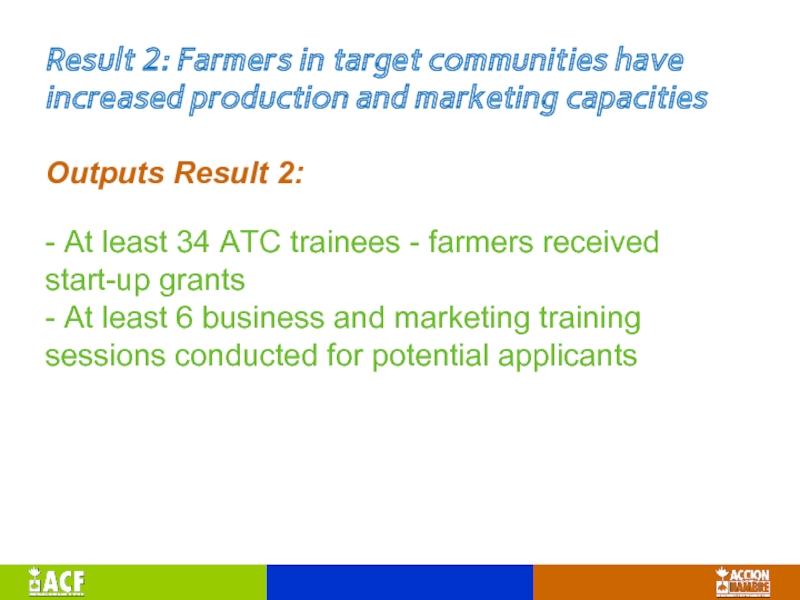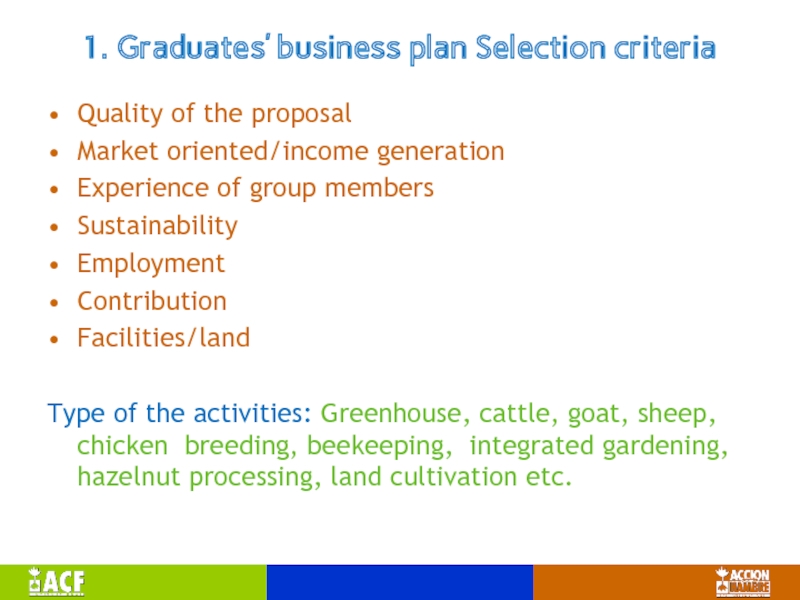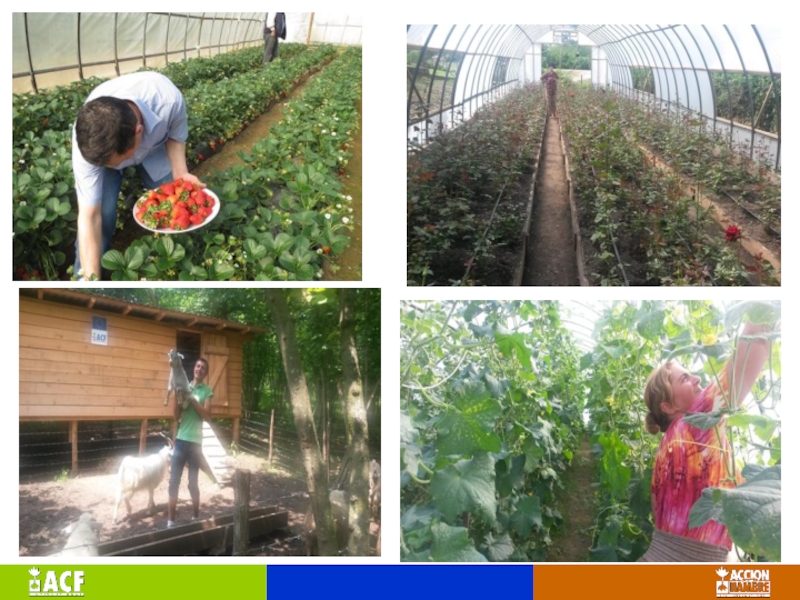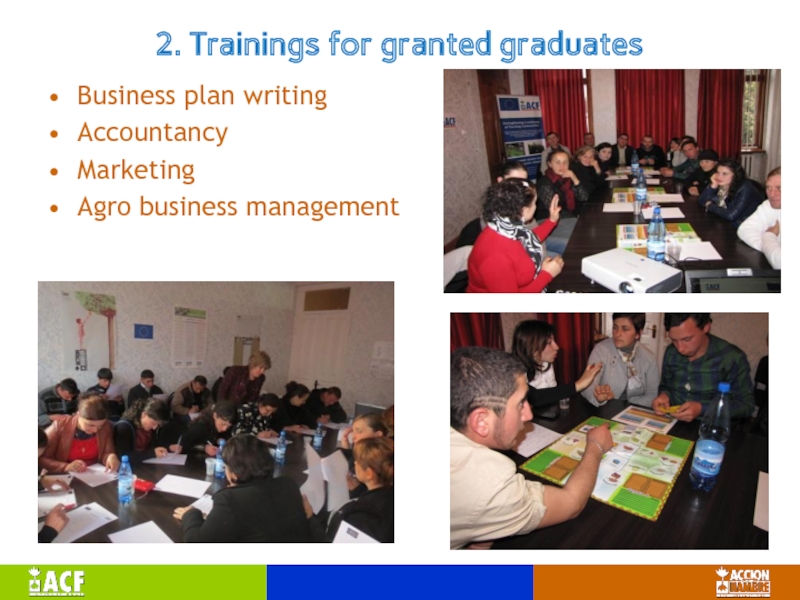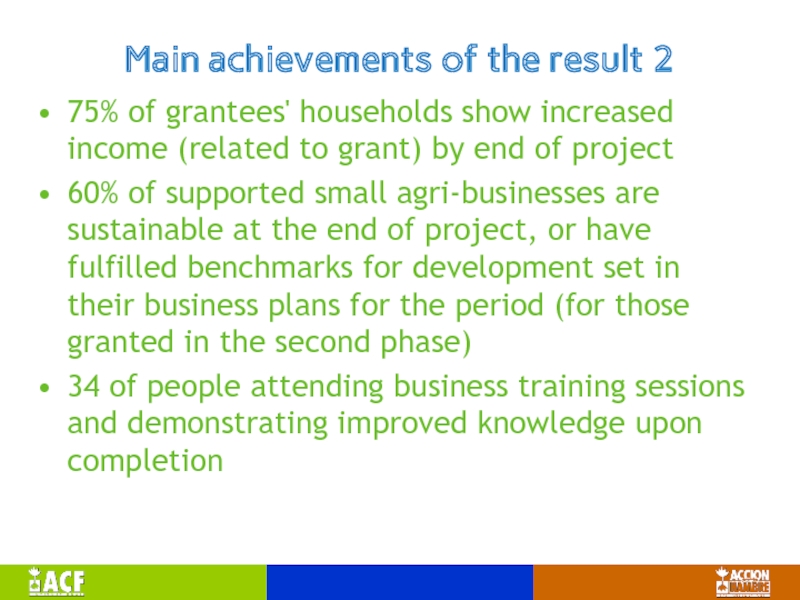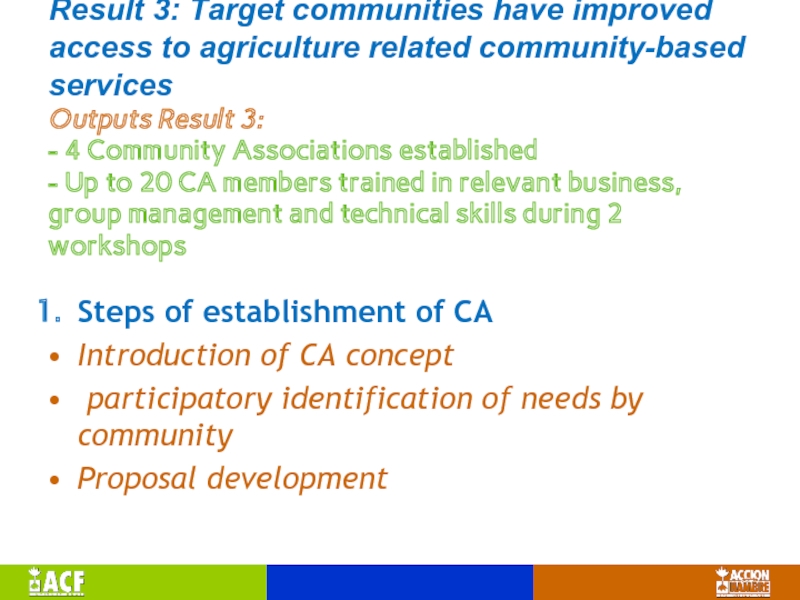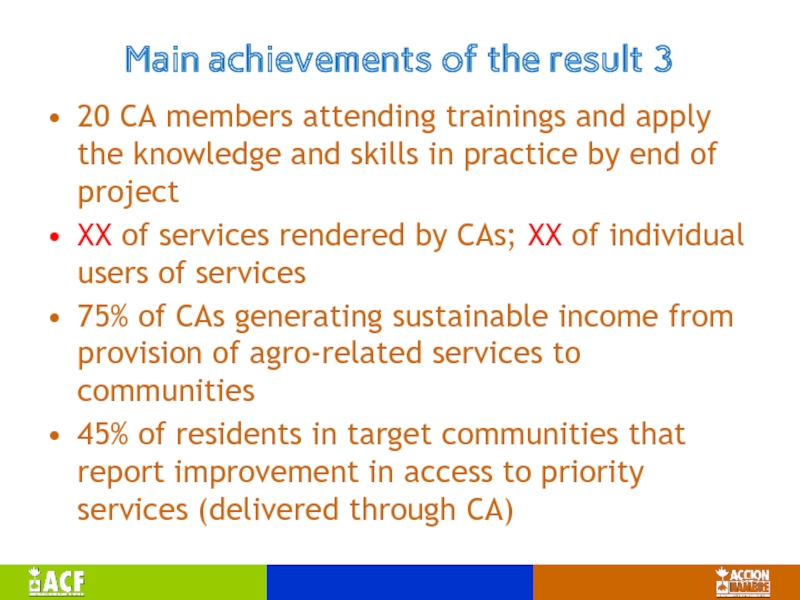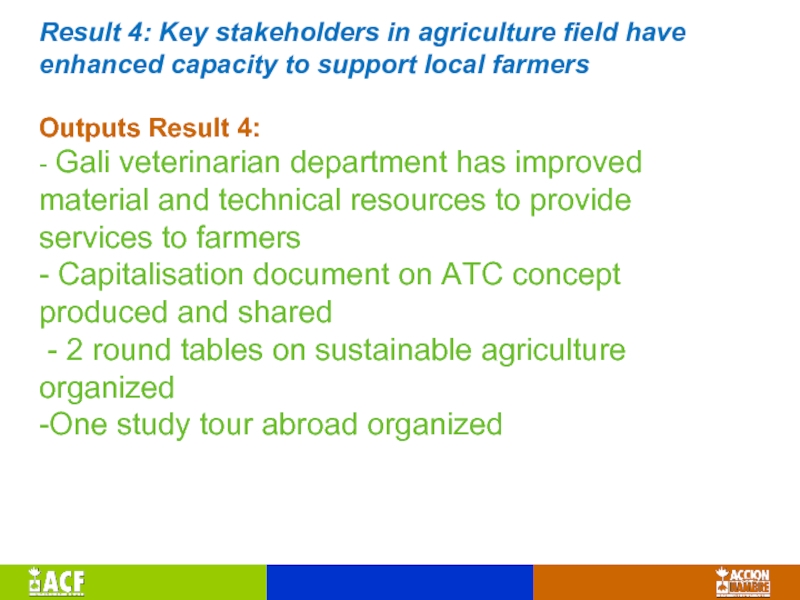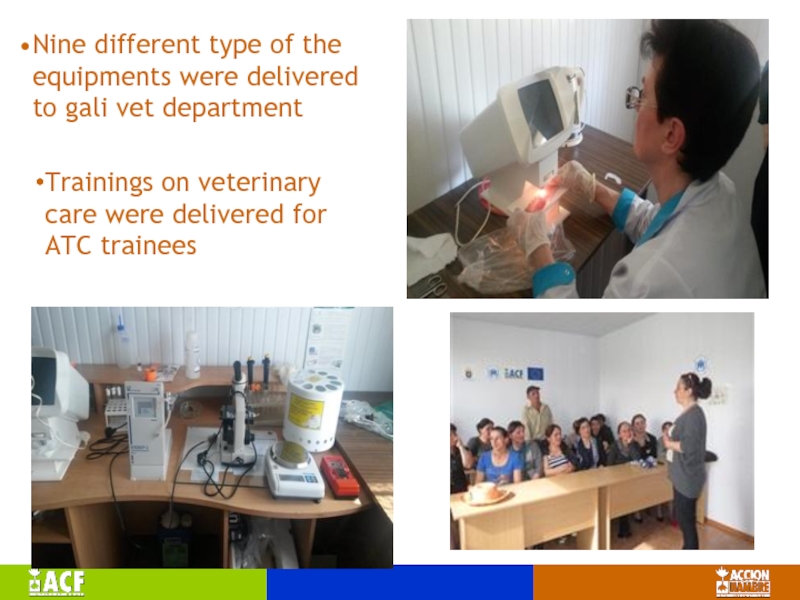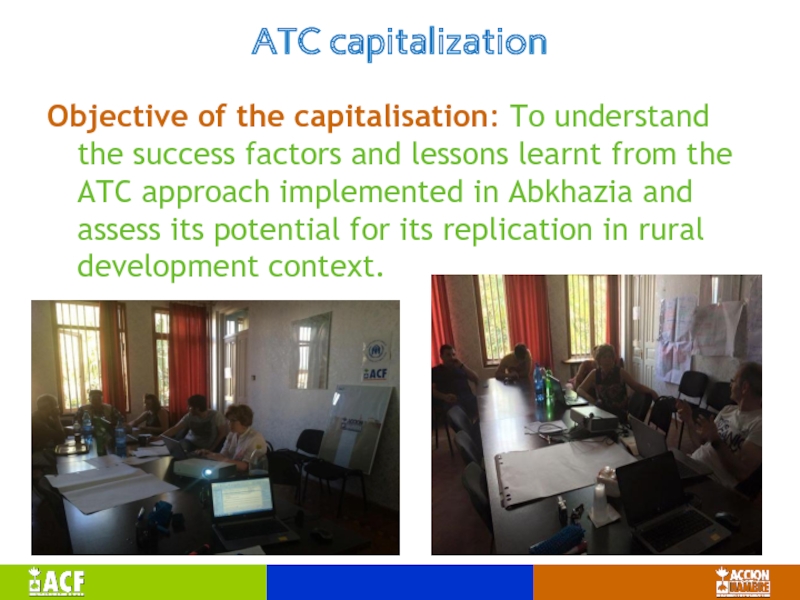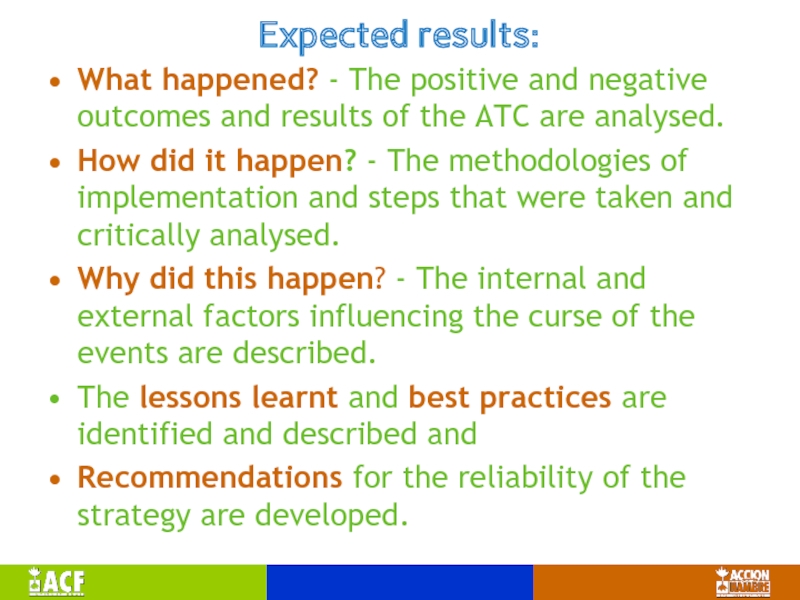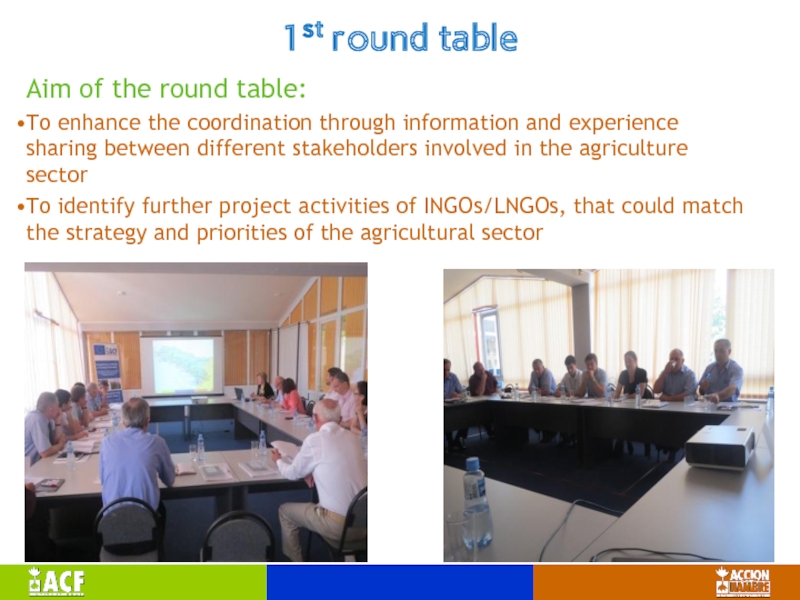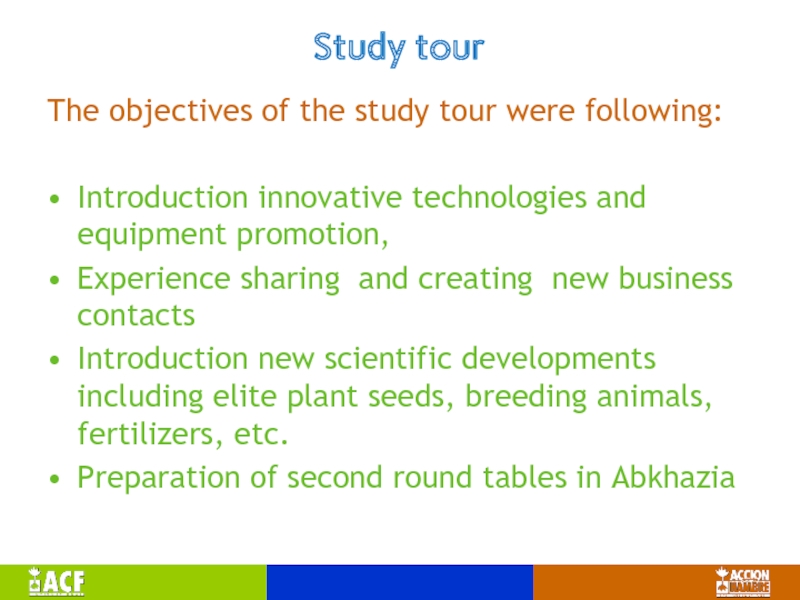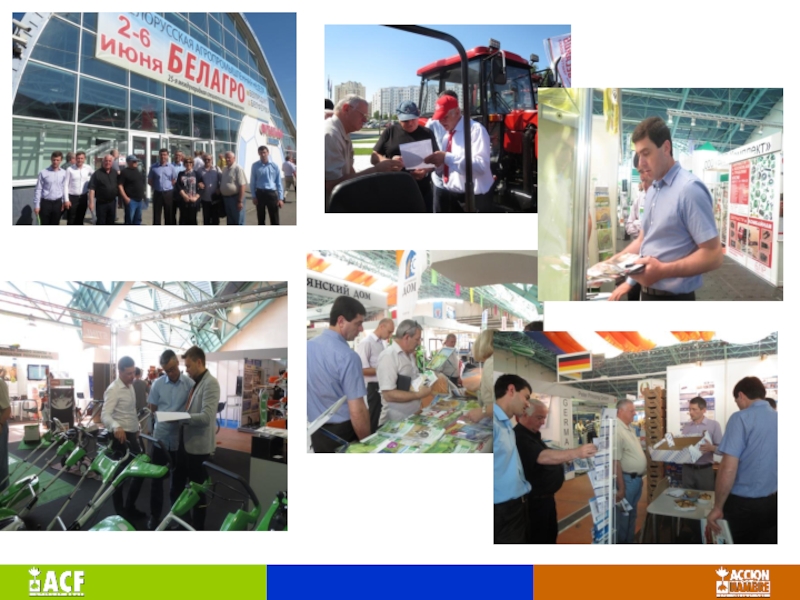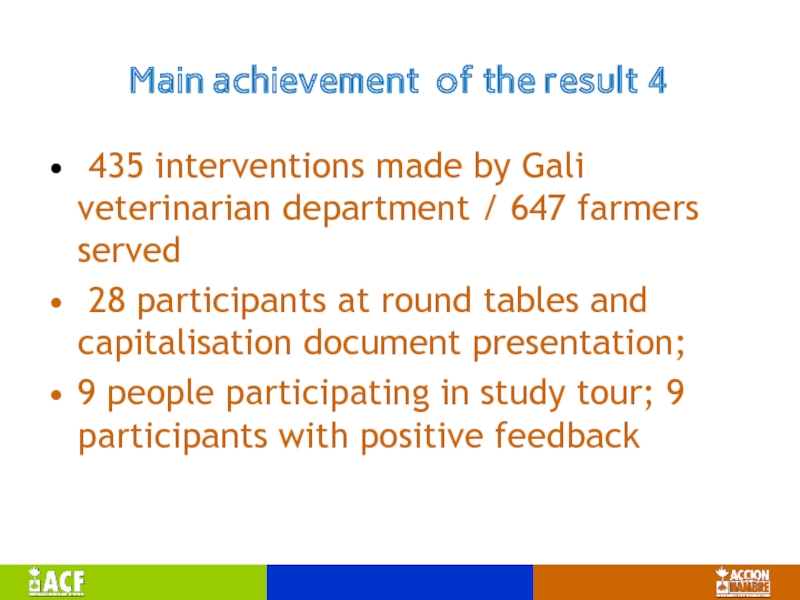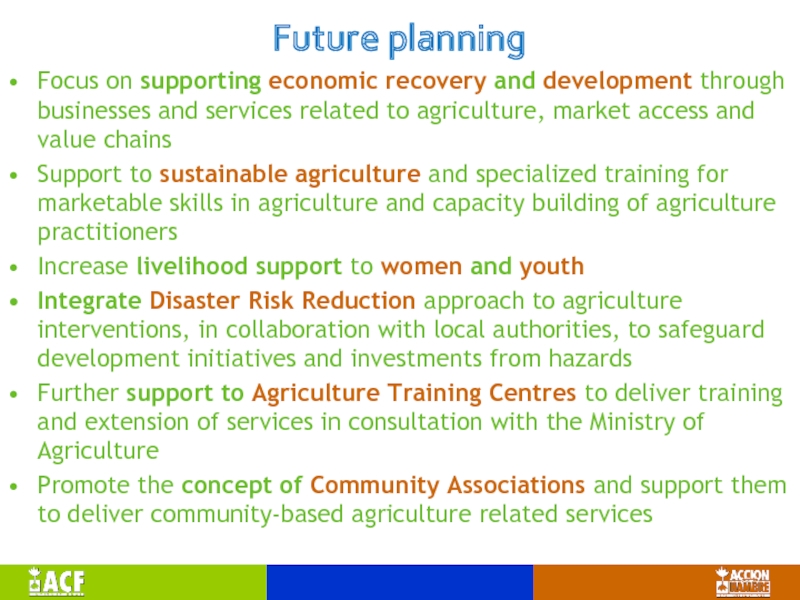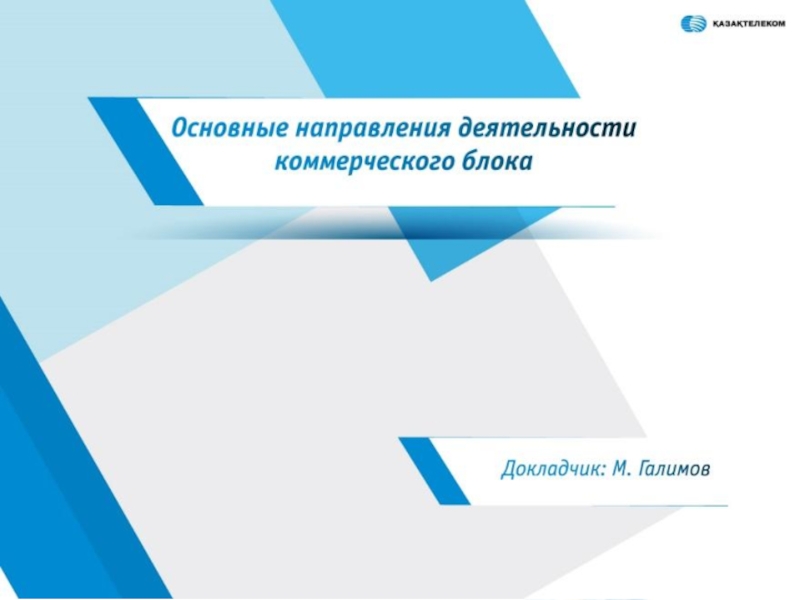- Главная
- Разное
- Дизайн
- Бизнес и предпринимательство
- Аналитика
- Образование
- Развлечения
- Красота и здоровье
- Финансы
- Государство
- Путешествия
- Спорт
- Недвижимость
- Армия
- Графика
- Культурология
- Еда и кулинария
- Лингвистика
- Английский язык
- Астрономия
- Алгебра
- Биология
- География
- Детские презентации
- Информатика
- История
- Литература
- Маркетинг
- Математика
- Медицина
- Менеджмент
- Музыка
- МХК
- Немецкий язык
- ОБЖ
- Обществознание
- Окружающий мир
- Педагогика
- Русский язык
- Технология
- Физика
- Философия
- Химия
- Шаблоны, картинки для презентаций
- Экология
- Экономика
- Юриспруденция
ACF Abkhazia Photo ACF International презентация
Содержание
- 1. ACF Abkhazia Photo ACF International
- 2. ACF International Founded in France
- 3. Sectors of interventions Food Security and Livelihoods
- 4. Food security and livelihood intervention Project:
- 5. Overall Objective: To contribute to sustainable socio-economic
- 6. Result 1: Farmers in target area have
- 8. 2. Teaching process Trainees selection criteria
- 9. Training curriculum The curriculum is consisted over
- 10. Main achievements of the result 1
- 12. Result 2: Farmers in
- 13. 1. Graduates’ business plan Selection criteria
- 15. 2. Trainings for granted graduates Business
- 16. Main achievements of the result 2
- 17. Result 3: Target communities have improved access
- 18. 2. Trainings for CA members Business plan writing Accountancy Marketing Agro business management
- 19. Main achievements of the result 3
- 20. Result 4: Key stakeholders in agriculture field
- 21. Nine different type of the equipments were
- 22. ATC capitalization Objective of the capitalisation: To
- 23. Expected results: What happened? - The positive
- 24. 1st round table Aim of the round
- 25. Study tour The objectives of the study
- 27. Main achievement of the result 4
- 28. Future planning Focus on supporting economic
- 29. Thanks!
Слайд 2ACF International
Founded in France in 1979
Nongovernmental, non-political, non-confessional, non-profit organisation
More
Present in the Abkhazia since 1994
Local Staff: 15
Expatriate staff: 1
Office in Gal and Sukhum
Слайд 3Sectors of interventions
Food Security and Livelihoods (FSL)
Water, Sanitation and Hygiene (WASH)
Disaster
Nutrition
Main donors: EU,Sida, Unicef, UNDP, UNHCR
Слайд 4Food security and livelihood intervention
Project: Strengthening Livelihoods of Farming Communities in
Duration: 10 June 2013 –10 June 2015
Donor: EU/ENPI
Location: 4 communities in Gali district: Papinrkhua , V. Barjap, Otoba I, Makhunjra
Слайд 5Overall Objective: To contribute to sustainable socio-economic development of conflict affected
Слайд 6Result 1: Farmers in target area have enhanced knowledge and skills
1. Criteria for establishment of ATC
Local agronomic knowledge
Commitment
Land availability
and infrastructure
Слайд 82. Teaching process
Trainees selection criteria
age (18-55), family size, unemployment in
Слайд 9Training curriculum
The curriculum is consisted over 240 hours, during a period
Baseline, midline and final exam ware delivered during the 6 month
Слайд 10Main achievements of the result 1
100% of ATCs (3 new
240 training sessions held in ATCs, 105 of students with attendance rate from 80-100%
90% of trainees successfully graduate from ATCs by end of project (average mark 13 / 15)
90% of trainees continue to use new techniques and livelihood resilience measures in their farming
# of persons attending presentation of capitalisation document, having access to it and providing feedback (will be done in future)
Слайд 12 Result 2: Farmers in target communities have increased production and marketing
Слайд 131. Graduates’ business plan Selection criteria
Quality of the proposal
Market oriented/income
Experience of group members
Sustainability
Employment
Contribution
Facilities/land
Type of the activities: Greenhouse, cattle, goat, sheep, chicken breeding, beekeeping, integrated gardening, hazelnut processing, land cultivation etc.
Слайд 152. Trainings for granted graduates
Business plan writing
Accountancy
Marketing
Agro business management
Слайд 16Main achievements of the result 2
75% of grantees' households show
60% of supported small agri-businesses are sustainable at the end of project, or have fulfilled benchmarks for development set in their business plans for the period (for those granted in the second phase)
34 of people attending business training sessions and demonstrating improved knowledge upon completion
Слайд 17Result 3: Target communities have improved access to agriculture related community-based
Steps of establishment of CA
Introduction of CA concept
participatory identification of needs by community
Proposal development
Слайд 182. Trainings for CA members
Business plan writing
Accountancy
Marketing
Agro business management
Слайд 19Main achievements of the result 3
20 CA members attending trainings and
XX of services rendered by CAs; XX of individual users of services
75% of CAs generating sustainable income from provision of agro-related services to communities
45% of residents in target communities that report improvement in access to priority services (delivered through CA)
Слайд 20Result 4: Key stakeholders in agriculture field have enhanced capacity to
Слайд 21Nine different type of the equipments were delivered to gali vet
Trainings on veterinary care were delivered for ATC trainees
Слайд 22ATC capitalization
Objective of the capitalisation: To understand the success factors and
Слайд 23Expected results:
What happened? - The positive and negative outcomes and results
How did it happen? - The methodologies of implementation and steps that were taken and critically analysed.
Why did this happen? - The internal and external factors influencing the curse of the events are described.
The lessons learnt and best practices are identified and described and
Recommendations for the reliability of the strategy are developed.
Слайд 241st round table
Aim of the round table:
To enhance the coordination through
To identify further project activities of INGOs/LNGOs, that could match the strategy and priorities of the agricultural sector
Слайд 25Study tour
The objectives of the study tour were following:
Introduction innovative technologies
Experience sharing and creating new business contacts
Introduction new scientific developments including elite plant seeds, breeding animals, fertilizers, etc.
Preparation of second round tables in Abkhazia
Слайд 27Main achievement of the result 4
435 interventions made by Gali
28 participants at round tables and capitalisation document presentation;
9 people participating in study tour; 9 participants with positive feedback
Слайд 28Future planning
Focus on supporting economic recovery and development through businesses
Support to sustainable agriculture and specialized training for marketable skills in agriculture and capacity building of agriculture practitioners
Increase livelihood support to women and youth
Integrate Disaster Risk Reduction approach to agriculture interventions, in collaboration with local authorities, to safeguard development initiatives and investments from hazards
Further support to Agriculture Training Centres to deliver training and extension of services in consultation with the Ministry of Agriculture
Promote the concept of Community Associations and support them to deliver community-based agriculture related services
